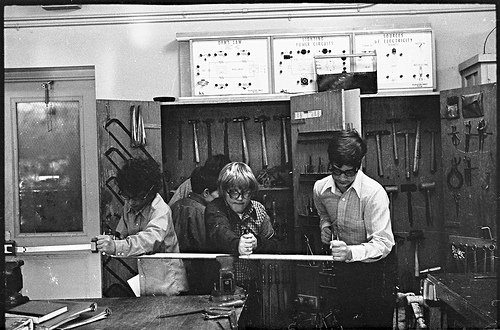In his book, Shop Class as Soulcraft: An Inquiry into the Value of Work, Mathew B. Crawford, tells how he discovered that he could not get a meaningful job with his advanced degree—a PhD in political philosophy from the University of Chicago.
He worked for a while in a cubical as an indexer abstracter making $23,000 a year and at another time as a SAT tutor making $15 an hour. Crawford finally found satisfaction as a “gearhead” fixing motorcycles.
Crawford laments the loss of high school shop classes, and the misinformed notion that schools must produce “knowledge worker,” by preparing students for four-year programs. According to Crawford, three-forth of high school shop classes in California have disappeared since the 1980s. He sees the present system turning out an army of clerks that he likens to the Dilbert cartoon.
I completely understand Crawford’s satisfaction fixing things, “Seeing a motorcycle about to leave my shop under its own power, several days after arriving in the back of a pickup truck, I suddenly don’t feel tired, even though I’ve been working on an uncovered floor all day.”
I believe that we need gearheads as well as bureaucrats, but shop is important to all since, like science, it gives grounding in basic concepts of technology and problem solving.
Academicians commonly refer to all fields of endeavor as “disciplines.” In a strict sense a discipline is a field with rigorous rules. Natural sciences and math are disciplines. So is shop. Political science and economics are not since at some point they rely on opinion.
I believe that all thinking can be grounded by working in a discipline. Such things as “common sense” are the results.
In chemistry, and physics students learn an important part of the scientific method—experiments must be reproducible, but, at high school level science, students don’t learn how to apply the scientific method—create a hypothesis, and design an experiment to test this hypothesis.
Troubleshooting and making repairs in shop class utilizes the complete scientific method. To repair a malfunctioning device the student must first hypothesize why it is not working. Next the student must design an experiment (test) to determine the correctness of this hypothesis. The student must repair and test that the device is working.
Shop classes offer a great opportunity to teach real critical thinking. Educators should be glad that making and fixing, as Crawford reminds us, is satisfying, and students are eager to learn it.
My next post will consider the decline of shop classes in the community college system.
Photo Credit: Flickr




Thanks, I enjoyed the read.
I also enjoy reading.. thanks
Thanks, I enjoyed the read.